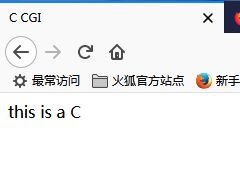http服务器实现(三)
前言
本文基于http服务器实现(二)来完成一个能处理http静态页面和动态页面请求的web服务器。
涉及到的内容有:
- CGI 理解
- 程序中注意的坑提醒
- 源码中对get请求的分析
- 用火狐浏览器测试
- 未解决的问题
- 服务器程序全部源码
http服务器实现(一)讲的是http服务器软件整体的架构,http服务器实现(二)主要讲的是http报文解析部分,这一节紧随前面的步骤实现一个小型的http服务器。服务器目前支持get请求,可以获取静态页面和动态(cgi) 页面。稍后,将结合火狐浏览器来演示成果。在后面的文章中,会相继完善http服务器的功能。例如,支持处理客户端的post请求,把程序做成守护进程,增加一些信号的处理等等。看完本节之后,你会发现开发一个web服务器的基本功能是如此的简单!但是,开发一个长期运行而不奔溃的健壮的web服务器是一件很困难的事情,需要方方面面考虑到,像高并发处理、效率优化、信号捕捉、安全性能、HTTPS 协议支持、各种后台语言的支持等等。刚调试好了程序,现在把成果分享出来。
快速理解本文的方法是:把本节代码下载下来,然后自己动手实验,通过log打印、实验结果去理解。代码能够编译得过且能运行!
一、CGI(通用网关接口)
CGI 是Web 服务器运行时外部程序的规范,按CGI 编写的程序可以扩展服务器功能。CGI 应用程序能与浏览器进行交互,还可通过数据库API 与数据库服务器等外部数据源进行通信,从数据库服务器中获取数据。可以简单理解是CGI是可执行程序,例如二进制可执行文件,shell脚本等。CGI经常向标准输出,也就是终端打印出HTML数据。在服务器程序中,我们只需要用dup2函数把标准输出重定向到socket描述符,把CGI输出的数据发送给浏览器,然后浏览器将显示这些数据。来看看一些实例。
如下,是一个C语言写的程序,我们看到str字符指针上存放一串字符串,然后向终端打印出来。
#include C CGI \r\n"
"this is a C
"
"";
printf("%s",str);
return 0;
}用gcc c_program.c -o c_program.cgi编译成二进制文件。c_program.cgi就是一个CGI可执行程序。我们关注的重点是打印出来的数据。我们可以看出打印出来的是
Content-Type: text/html
<html><head><title>C CGItitle>head>
<body><p>this is a Cp>body>html>我们要做的就是把这段打印传输给浏览器。很简单,只需要用dup2(fd, STDOUT_FILENO)把标准输出重定向到sockfd。来看看浏览器接收到数据之后是怎样显示的,画面如下:

跟我们预料的一样,通过上面的实验,是否更加形象的明白CGI究竟是怎样的回事呢?
我们还可以用shell来编写,再看看下面的例子:
#!/bin/bash
echo "Content-type:text/html"
echo ""
echo "this is a shell program"
echo ""
echo "a text"
echo ""通过上面两个例子,大致知道了CGI无非就是要往终端打印出浏览器要接收的数据,运用重定向的方法可以很方便的实现。我们还可以往CGI程序传入参数,然后CGI程序根据我们传进去的参数动态修改打印的数据。这些知识点在下面的程序中都将会遇到。
二、需要注意的点、坑
在这里讲下,我再调试程序的时候遇到的坑和需要注意到的点。
bind函数:
所谓bind,就是指绑定本地接受端口。 指定ip,是为了分辨多ip主机。
比如你的机器有两个ip
192.168.1.105
192.168.2.1
如果你server_sockaddr.sin_addr.s_addr = inet_addr("192.168.1.105"); 然后监听6000端口
这时其他机器只有连接上192.168.1.105:6000才能访问到服务器,连接 192.168.2.1 将会失败。
如果server_sockaddr.sin_addr.s_addr =htonl(INADDR_ANY); 的话,两个ip 的6000端口都能连接得上。
如果不知道本地ip地址,可以在终端用ifconfig命令打印出来,bind绑定的ip必须是本地有才可以,随便绑定一个ip是不会成功的。
mmap函数:
在程序中,处理get静态请求的时候,用到了mmap函数。它的作用是把文件的内容映射到内存空间中,我们可以操作这段内存来读写数据。那为什么要这么做呢?常规文件操作需要从磁盘到页缓存再到用户主存的两次数据拷贝。而mmap操控文件,只需要从磁盘到用户主存的一次数据拷贝过程。因此mmap效率更高。
dup2函数:
这里简单理解为重定向函数,可以把一个文件描述符重定向到另一个文件描述符。这也是实现CGI机制的关键。
Firefox设置:
本文我用到了火狐浏览器实验。在访问服务器的时候,火狐弹出了警告:
此网址使用了一个通常用于网络浏览以外目的的端口。出于安全原因,Firefox 取消了该请求
用如下方法或者使用ie浏览器可以规避。
解决方法如下:
在Firefox地址栏输入about:config,然后在右键新建一个字符串键network.security.ports.banned.override,将需访问的端口号添加上,这里我添加了端口号6000。
三、服务器get请求源码分析
以http服务器实现(二)的代码为基础,在header_parse函数下 status == BODY_READ 的地方,添加了process_header_end函数来针对http GET请求的处理。先来看下这部分代码:
int process_header_end()
{
int is_static;
struct stat sbuf;
char buf[MAXLINE], uri[MAXLINE], version[MAXLINE];
char filename[MAXLINE], cgiargs[MAXLINE];
//前面已经把方法解析出来放入method全局变量,这里判断是不是GET请求,注:当前版本只支持GET请求。
if (method != M_GET) {
perror("does not implement this method");
//此处发送501响应
return;
}
//parse_uri函数有两个功能,一是解析出请求的文件路径,二是判断该请求是静态的还是动态的。
is_static = parse_uri(request_uri, filename, cgiargs);
if (stat(filename, &sbuf) < 0) {
perror("couldn't find this file");
return;
}
if (is_static) { //对静态请求处理
if (!(S_ISREG(sbuf.st_mode)) || !(S_IRUSR & sbuf.st_mode)) {
perror("couldn't read the file");
return;
}
serve_static(fd, filename, sbuf.st_size);
}
else { //对动态请求处理
if (!(S_ISREG(sbuf.st_mode)) || !(S_IXUSR & sbuf.st_mode)) {
perror("couldn't run the CGI program");
return;
}
serve_dynamic(fd, filename, cgiargs);
}
return 0;
}以上代码,利用之前对请求行解析出来的结果,判断是不是GET请求,如果是,继续解析URI,如果是静态GET,就走静态处理路线,如果是CGI请求,就走动态处理路线。接下来看看静态GET请求的代码:
void serve_static(int fd, char *filename, int filesize)
{
printf("this is serve_static\n");
int srcfd;
char *srcp, filetype[MAXLINE], buf[MAXLINE];
//发送响应头给客户端
get_filetype(filename, filetype);
sprintf(buf, "HTTP/1.0 200 OK\r\n");
sprintf(buf, "%sServer: Tiny Web Server\r\n", buf);
sprintf(buf, "%sContent-length: %d\r\n", buf, filesize);
sprintf(buf, "%sContent-type: %s\r\n\r\n", buf, filetype);
if (rio_writen(fd, buf, strlen(buf)) != strlen(buf))
linux_error("rio_writen");
//发送响应体给客户端
if((srcfd = open(filename, O_RDONLY, 0)) < 0)
linux_error("open");
//将文件内容映射到虚拟内存中,提高文件的读写效率
srcp = Mmap(0, filesize, PROT_READ, MAP_PRIVATE, srcfd, 0);
close(srcfd);
//将请求的内容发送给浏览器
if (rio_writen(fd, srcp, filesize) != filesize)
linux_error("rio_writen");
//解除映射
Munmap(srcp, filesize);
close(fd);
}从上面可以看出,serve_static函数主要干的事情是打开浏览器请求的文件,然后把文件内容映射到虚拟内存中,然后再把虚拟内存中的数据(文件的内容)发送给浏览器。其中,rio_writen函数是对write函数的包装,详情见源码。动态内容请求处理函数如下:
void serve_dynamic(int fd, char *filename, char *cgiargs)
{
printf("this is serve_dynamic\n");
char buf[MAXLINE], *emptylist[] = { NULL };
// 发送响应头第一行
sprintf(buf, "HTTP/1.1 200 OK\r\n");
if (rio_writen(fd, buf, strlen(buf)) != strlen(buf))
linux_error("rio_writen");
//发送响应头选项
sprintf(buf, "Server: Tiny Web Server\r\n");
if (rio_writen(fd, buf, strlen(buf)) != strlen(buf))
linux_error("rio_writen");
printf("filename=%s\n",filename);
//fork出子进程用于发送请求的数据
int pid = fork();
if (pid == 0)// 子进程
{
//setenv("QUERY_STRING", cgiargs, 1);
if( dup2(fd, STDOUT_FILENO) < 0) //重定向标准输出到socket fd
linux_error("dup2");
if (execve(filename, emptylist, environ) < 0)//执行CGI可执行程序,新的程序将替代掉子进程
linux_error("Execve error");
}
else if (pid < 0) //fork错误
linux_error("fork");
else //父进程
{
if (wait(NULL) < 0) //父进程等待子进程执行完成
linux_error("wait");
}
}前面已经讲过了CGI,通过对这些代码,CGI应该就能够更加清晰理解了。serve_dynamic函数先把响应头一部分发送给浏览器,然后fork出子进程。子进程调用dup2(fd, STDOUT_FILENO)函数把标准输出重定向到socket描述符,然后调用execve函数执行我们编写好的CGI可执行程序。通过这两个函数,最后CGI向终端输出的数据最后就发送给了浏览器。父进程调用wait等待子进程退出。
四、火狐浏览器测试
首先,服务器程序同级目录创建home.html默认页面,当访问服务器时,如果不添加文件路径,将默认请求此页面的内容。并且创建cgi-bin目录,这里面将存放我们的cgi脚本,名字都可以在程序中指定,获取更加普遍的做法是写到配置文件中,然后程序去解析这个配置文件,如boa开源程序的boa.conf配置文件。创建好之后如下图:
ubuntu@ubuntu:~/project/web-server$ ls
cgi-bin home.html web-server3.c web-server3 namei.jpg
ubuntu@ubuntu:~/project/web-server/cgi-bin$ ls
c_program.c c_program.cgi helloworld.sh shell.cgi静态页面请求测试:
打开火狐浏览器,输入网址http://192.168.1.105:6000/home.html或http://192.168.1.105:6000
浏览器显示如下:

home.html文件内容:
<html>
<head>
<title>This is my first HTML!title>
heead>
<body>
<h1>This is heading!h1>
<p>Hello world!p>
body>
html>利用BurpSuite抓包,结果如下:
这是浏览器的请求。注意:Cache-Control: max-age=0下面有一行空行。
GET / HTTP/1.1
Host: 192.168.1.105:6000
User-Agent: Mozilla/5.0 (Windows NT 6.1; WOW64; rv:57.0) Gecko/20100101 Firefox/57.0
Accept: text/html,application/xhtml+xml,application/xml;q=0.9,*/*;q=0.8
Accept-Language: zh-CN,zh;q=0.8,zh-TW;q=0.7,zh-HK;q=0.5,en-US;q=0.3,en;q=0.2
Accept-Encoding: gzip, deflate
Connection: keep-alive
Upgrade-Insecure-Requests: 1
Cache-Control: max-age=0
这是服务器的响应。注意:Content-type: text/html下面有一行空行。
HTTP/1.0 200 OK
Server: Tiny Web Server
Content-length: 171
Content-type: text/html
<html>
<head>
<title>This is my first HTML!title>
heead>
<body>
<h1>This is heading!h1>
<p>Hello world!p>
body>
html>抓包结果对比home.html文件内容,发现浏览器显示的内容跟home.html是一样的。这是浏览器GET请求的静态页面。
接下来,我们再来演示请求静态图片:
输入网址http://192.168.1.105:6000/namei.jpg
动态页面请求测试:
输入网址http://192.168.1.105:6000/cgi-bin/shell.cgi
ubuntu@ubuntu:~/project/web-server/cgi-bin$ cat shell.cgi
#!/bin/bash
echo "Content-type:text/html"
echo ""
echo "this is a shell program"
echo ""
echo "a text"
echo ""以上实验结果会使我们对get请求更加形象地理解。
五、未解决的问题
在调试程序的过程中,发现动态获取cgi页面时,浏览器响应特别慢,而且抓包的时候,抓不到Content-type:text/html头选项,调试了很久,怀疑是服务器发送给浏览器的数据格式不太对,导致了浏览器在解析服务器传来的数据耗费了大量的时间。因为我在浏览器向服务器请求的过程、服务器处理浏览器请求的过程中并无延迟很多。所以,只可能是浏览器解析服务器的数据那一阶段导致的。具体原因,还得排查。不吝赐教!
六、服务器程序全部源码
源码有点长,在http服务器实现(二)的基础上,本节增加的代码大概有200行,参考了Tiny web的代码。为了方便拿去测试学习,就全部贴出来了,全部有600多行,有点长。
/*
* web-server, an http server
* web-server3.c
*/
#include 
